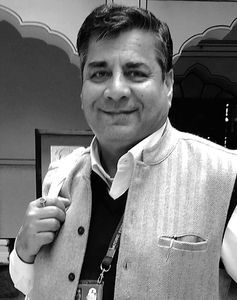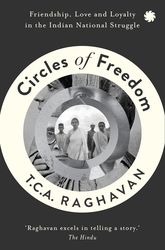In his new book, diplomat-turned-historian T.C.A. Raghavan offers a different view of India’s most well-known story―the independence struggle. Till now, notwithstanding the well-known bromances between big leaders, the story of the independence movement has never really been told through the prism of personal friendships. Raghavan does just that in Circles of Freedom: Friendship, Love and Loyalty in the Indian National Struggle.

At its heart, the book is about three men and their friendship with poet Sarojini Naidu―lawyer-politicians Asaf Ali, who became the first Indian ambassador to the United States, and Syed Mahmud, who became deputy minister of external affairs, and journalist Syud Hossain, India’s first ambassador to Egypt.

“I don’t think anyone was ever was blind to the fact that they were not in the foreground [of the freedom struggle],” says Raghavan. “The question I was asking was not about the big political issue or even about the big Hindu-Muslim issue, because those, of course, are there. The question I ask [is about] people and their personal feelings―love, friendship, loyalty. How was that part of the big political struggle?”

Naidu’s feisty, fearless and sometimes even flirty relationship with the men form the circle through which Raghavan views the politics of the time. “Radiant and restless, full of sparkling life and laughter”, is how Asaf describes Naidu, a mother of four in her thirties. “They (the men),” says Raghavan, “came from cloistered backgrounds, and nothing in their social experience prepared them to meet someone like her.”
Naidu soon became their guide and expanded their world. A fierce proponent of Hindu-Muslim unity, she did more than just preach. “I didn’t know the extent to which she invested in her Muslim friends,” says Raghavan.
The book offers a glimpse into her inner world, which included friends such as Muhammad Ali Jinnah. (There was a rumour that she and Jinnah were lovers, but she eventually became a “pillar of emotional support to Ruttie”―aka Rattanbai, Jinnah’s wife.) There are mentions of Naidu’s illness, which still remains a mystery. In one of her letters to her children, the 11-year-old Ranadheera in England, Naidu writes, “You know, a family is like a piece of machinery. Each separate part must be in good order… for the machinery to keep going.”
From the Khilafat movement to the partition of India, Raghavan steers his tale through the undercurrents of religious polarisation in the freedom movement. He also focuses on an unusual and ‘explosive’ marriage―between Asaf and activist Aruna in 1928 that, Raghavan writes, prompted an “explosion of political opposition”. “There were very few [such marriages], and they were not in this class,” he says. “Asaf Ali was no Jinnah. He was not even Motilal Nehru when he was in the struggling middle class.”
The Hindu Mahasabha threatened to harm the couple. “Apart from the obvious religious divide and the considerable difference [between them] in age, what was unusual was that this was not a union following a sudden infatuation or dramatic falling in love, but seemingly carefully thought through by both parties,” writes Raghavan.
Even Naidu, he says, was a bit shocked by the marriage. “It comes across in one or two of her letters,” he says. “‘It will not be a success,’ Naidu told Syud in 1928.”
Yet, the marriage held. Aruna emerged out of Asaf’s shadow to become a revolutionary in her own right, and refused to accompany him to Washington, even though Gandhi suggested that it was her “duty” to do so.
They also never had any children. “I don’t know why,” says Raghavan. “We can only take a guess. Somebody who worked with Aruna speculated that it was because she didn’t want to have a child. Because she felt it would be a huge burden on the child, given the Hindu-Muslim issues and the fact that the child would be largely [in a] Muslim ecosystem. But we don’t know that. Aruna does not appear to have left any kind of memoir papers.”
Raghavan brings to life the chaos and the complexity of the time―the breathless fight for free-India, the attempts to bring about Hindu-Muslim unity, the pressures of religious fervour on the freedom movement, and the impacts all these had on personal lives.
But in the age of the big, fat history book, Circles of Freedom has very much an offbeat, arthouse feel. For this is a compelling story of the lives that are often just out of focus.
The book is also littered with delicious details. When Asaf and Syed are locked up in Ahmednagar jail with such leaders as Jawaharlal Nehru, J.B Kripalani, Maulana Abul Kalam Azad and Vallabhbhai Patel, a jailer brings the inmates bread and butter in a thali. This sends Maulana into a “towering rage”, writes Raghavan. Tea was refused unless it was served in cups and on trays.
There is also the story of the almost-marriage of Vijaya Lakshmi Pandit to Syud. There was an elopement, but Gandhi and Motilal Nehru quickly stepped in. Under the watchful gaze of Gandhi, Pandit is packed off to the Sabarmati Ashram.
There have been many explorations of the independence movement, but Raghavan’s is the first to present it through the prism of friendship, love and loyalty. His protagonists may not be icons, but they are still worthy heroes. Read the book.
Circles of Freedom: Friendship, Love and Loyalty in the Indian National Struggle
By T.C.A. Raghavan
Published by Juggernaut
Price Rs799; pages 408



